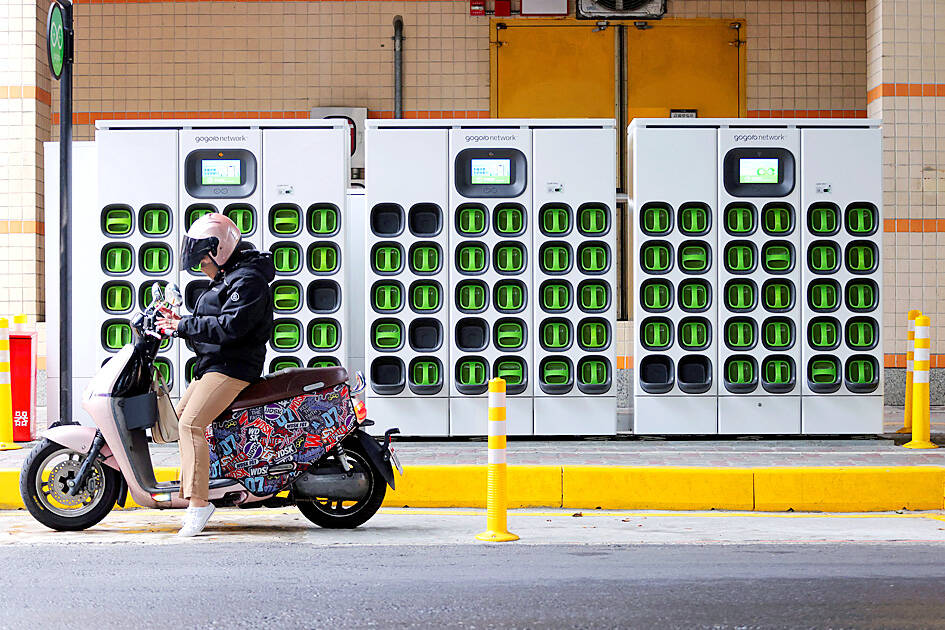Gogoro Inc (睿能創意), a supplier of battery swapping services and electric scooters, yesterday said that Singapore’s Land Transportation Authority has approved its participation in a sandbox pilot to deploy and validate battery swapping as a means for next-generation smart mobility.
Gogoro is tapping into the Singaporean market as it seeks to expand its global footprint, which includes China, India and Indonesia in the past two years.
The Taoyuan-based company said it is partnering with Jardine Cycle & Carriage, a diversified group with market-leading businesses across Southeast Asia, for the Singapore venture.

Photo: Annabelle Chih, Reuters
Jardine Cycle & Carriage’s subsidiary Cycle & Carriage will be the exclusive distributor of Gogoro’s electric scooters in Singapore, as well as the operator and installer of Gogoro’s battery-swapping infrastructure in the city-state, Gogoro said in a statement.
“Cities are in desperate need of sustainable transportation solutions, not just for consumers, but for businesses. Gogoro battery swapping provides a sustainable path for urban fleets that is safe, reliable, scalable and always available,” Gogoro founder and CEO Horace Luke (陸學森) said in the statement.
In Taiwan, Gogoro’s battery-swapping facilitates more than 25 percent of all quick commerce deliveries like food and online purchases ,and nearly 100 percent of all electric deliveries, Luke said.
“We are partnering with Jardine Cycle & Carriage Group to introduce this new sustainable business model for food delivery and logistics fleets in Singapore today and in other cities across the region in the future,” Luke said.
Launching soon, the Gogoro battery-swapping sandbox pilot will include Gogoro’s electric scooters, GoStation battery swap stations and smart batteries.
Cycle & Carriage will manage Gogoro’s battery-swapping network and vehicle fleet in Singapore. It will also work with a variety of food delivery and logistics fleets in the country.
The Gogoro sandbox supports Singapore’s Green Plan 2030 and its transition to sustainable energy and transportation.

Zhang Yazhou was sitting in the passenger seat of her Tesla Model 3 when she said she heard her father’s panicked voice: The brakes do not work. Approaching a red light, her father swerved around two cars before plowing into a sport utility vehicle and a sedan, and crashing into a large concrete barrier. Stunned, Zhang gazed at the deflating airbag in front of her. She could never have imagined what was to come: Tesla Inc sued her for defamation for complaining publicly about the vehicles brakes — and won. A Chinese court ordered Zhang to pay more than US$23,000 in

Taiwan Semiconductor Manufacturing Co (TSMC, 台積電) yesterday said that its investment plan in Arizona is going according to schedule, following a local media report claiming that the company is planning to break ground on its third wafer fab in the US in June. In a statement, TSMC said it does not comment on market speculation, but that its investments in Arizona are proceeding well. TSMC is investing more than US$65 billion in Arizona to build three advanced wafer fabs. The first one has started production using the 4-nanometer (nm) process, while the second one would start mass production using the

A TAIWAN DEAL: TSMC is in early talks to fully operate Intel’s US semiconductor factories in a deal first raised by Trump officials, but Intel’s interest is uncertain Broadcom Inc has had informal talks with its advisers about making a bid for Intel Corp’s chip-design and marketing business, the Wall Street Journal reported, citing people familiar with the matter. Nothing has been submitted to Intel and Broadcom could decide not to pursue a deal, according to the Journal. Bloomberg News earlier reported that Taiwan Semiconductor Manufacturing Co (TSMC, 台積電) is in early talks for a controlling stake in Intel’s factories at the request of officials at US President Donald Trump’s administration, as the president looks to boost US manufacturing and maintain the country’s leadership in critical technologies. Trump officials raised the

From George Clooney to LeBron James, celebrities in the US have cashed in on tequila’s soaring popularity, but in Mexico, producers of the agave plant used to make the country’s most famous liquor are nursing a nasty hangover. Instead of bringing a long period of prosperity for farmers of the spiky succulent, the tequila boom has created a supply glut that sent agave prices slumping. Mexican tequila exports surged from 224 million liters in 2018 to a record 402 million last year, according to the Tequila Regulatory Council, which oversees qualification for the internationally recognized denomination of origin label. The US, Germany, Spain,